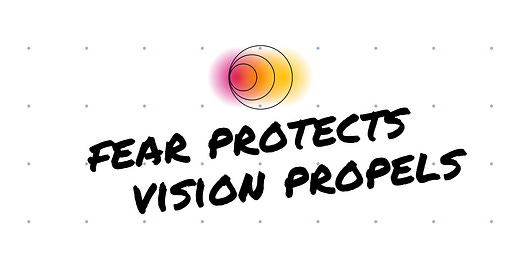Last week I had the pleasure of speaking with Nicole Khalil on her wonderful podcast This is Woman’s Work. We talked about how change really happens, and went deep into four of the 10 Truths of Radiant Change that guide my work.
Nicole asked me an important question that I’m betting a number of you are grappling with on any given day—I know I am. The question was:
People are so often afraid of change. How do we tell the difference between fear that protects us from actual danger vs. fear that holds us back from possibility?
Such a good question, right? And in many ways, an impossible one. We can’t see the future (if we could, we’d be less afraid of change!) so we can’t be certain anything will work out the way we want it to… ever. The unknown will always feel at least a little unsafe. So I’m not sure there’s a simple way to tease apart these two types of fear.
But the question stayed with me, and as I’ve turned it over in my mind, here are a few more thoughts that emerged:
We can start by seeing fear. Naming it. Feeling it in the body. Holding it in our hands.
If we can look at fear and know it’s here, maybe we can find its source and map its edges. We can honor its concerns and address them if needed. And then, we may be able to access the greater truths around it.
Once we know what we’re afraid of (failure? the unknown? spiders?) we can look to the evidence: What happened last time we were in a similar situation? What have others experienced in these circumstances? What is the actual worst that can happen, and is the risk worth the potential reward?
It may come down to the simple question of trusting ourselves. Knowing that if we take the risk and fail, we are resourceful and resilient enough to figure out the next wise step in the direction of our vision, our dream, our goal.
Ultimately, fear isn’t the emotion we want guiding our decisions. In acute life-and-death situations, maybe. But how often are we in those situations? The vast majority of the time, fear is inherently limiting. It’s doing its best to protect us, but is protection what we need?
Or do we need propulsion?
Case in Point: I had lunch this week with a leader I worked with over a decade ago. So much had happened in our lives and careers in the years since—including beautiful opportunities and terrible twists of fate—and it was fun to reflect on all the ways we’d both grown as people and as professionals.
Then, this leader surprised me by recalling some of the more unconventional ideas I’d pitched him back in the day, particularly around incorporating mindfulness practices into team and client engagements.
“I think I laughed at you,” he said.
It was true, he had. I’d forgotten, but it came flooding back—putting myself out there and being not only rejected but practically ridiculed by someone I admired and trusted.
Sounds painful, right? I suppose it was. But honestly, it wasn’t the first time that had happened to me, and it wouldn’t be the last. Anyone offering new, challenging ideas is going to have this experience many times over.
It would have been easy (and understandable!) to let fear of further rejection change my course, to take a safer, more conventional or acceptable route. For whatever reason, I didn’t. I suppose I trusted myself. Perhaps my vision overwhelmed my fear.
Either way, it all worked out. Here I was, a decade later, doing the work I’d always dreamed of. And sitting across the table from that same leader, who was now saying:
“Now I see mindfulness everywhere, and it’s making our workplaces healthier and more sustainable. I should’ve listened.”
I just smiled.
Agents of Radiant Change launches next month! This six-week course is for you if:
You’re leading a change initiative, strategic shift or process improvement
You’re meeting resistance—and maybe even being laughed at 😉
You feel alone in this work and are craving community and/or structured support
You don’t know where to begin, or you’re feeling stuck where you are
You want to have greater impact without burning out
This is a very special program, in intimate cohorts of no more than 12 of your fellow changemakers. If you have questions that aren’t answered on the course page, or if you aren’t sure if ARC is right for you, feel free to reach out.




